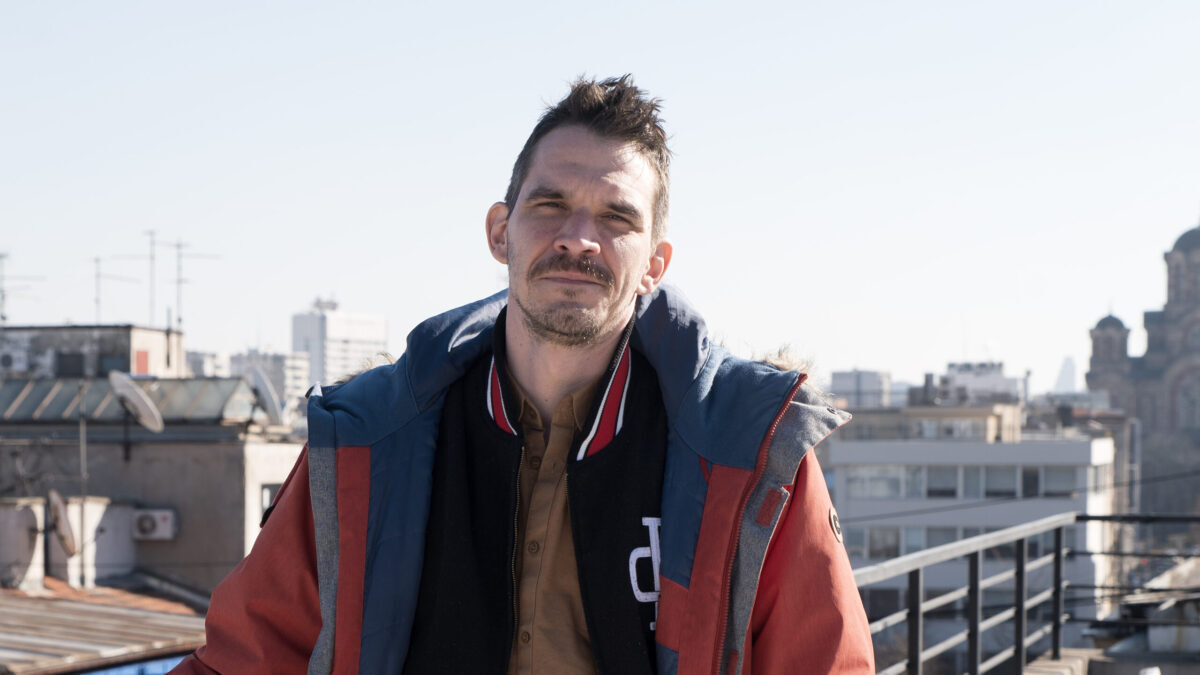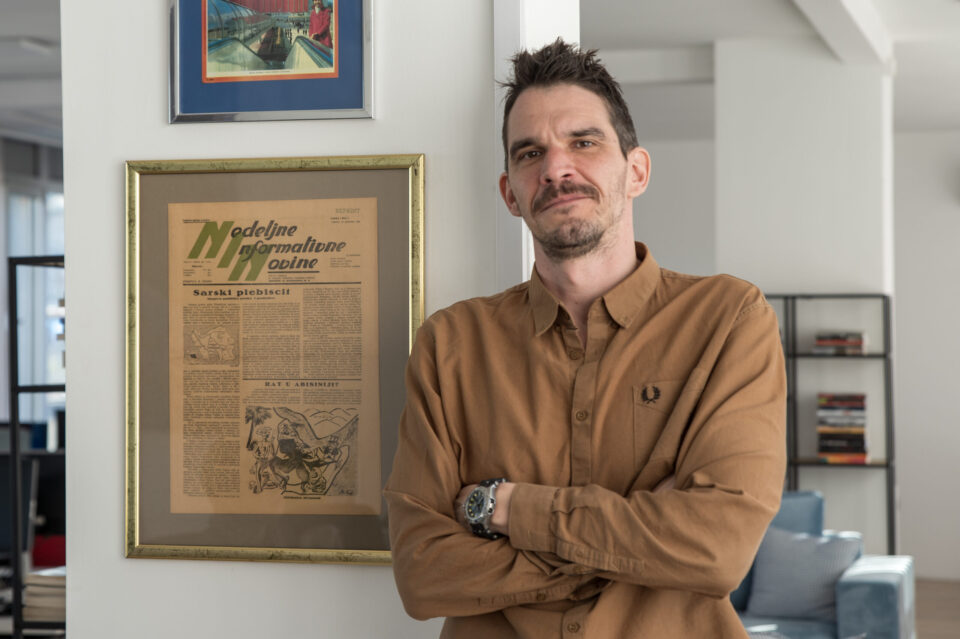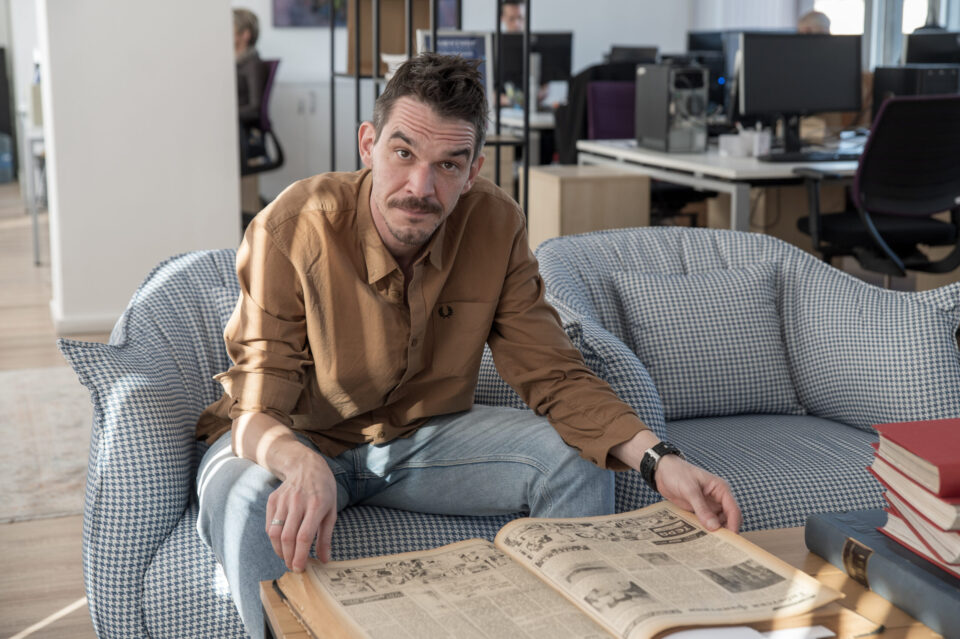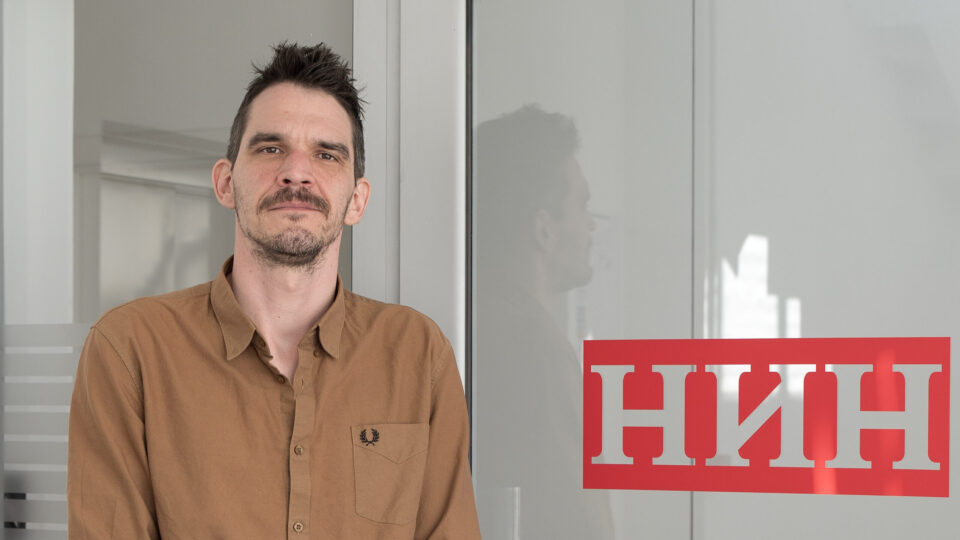If a journalist is surrounded by a good team of people with whom he will safeguard, be brave, research and think about topics together and share the good and the bad, the chance of him faltering becomes incomparably less

There are very few media in Serbia for which a journalist can write whatever they want, provided their reporting doesn’t violate the Code of Journalists of Serbia and that what they write can be argued. NIN weekly was among the few remaining oases of journalistic professionalism and Stefan Slavković has been a member of its editorial team since 2012. As the author of the political and foreign policy column, he followed how global events are reflected in the local context, i.e. Balkan and Serbian, while at the same time, trying to analyze and comment on them independently of daily political tensions and transient interpretative frameworks. “When you put away piles and piles of fake news, semi-information and unimportant events that often only serve to contribute to the media noise, you will be left with the constant struggle of big capital and its exponents on the one hand and a fragile society that is not yet sure what democracy should be on the others”, says Stefan Slavković.
You handed in your resignation in early January together with the editorial team and almost the entire editorial staff of NIN weekly and announced the launch of a new weekly, published by the United Media Group (UMG). It seems that this act was quite expected, but what does it actually mean? Has our society lost yet another of the very few independent media?
Let’s be clear, there are no independent media. NIN is a good example of this. It was privatized back in 2009 when it was bought by the conglomerate Ringier Axel Springer (RAS). Last year, under unclear circumstances, it was bought by the director of RAS, Jelena Drakulić Petrović. The media regulation in Serbia quite clearly stipulates that a public broadcaster can be only publicly owned media and anyone can easily notice that the public broadcaster Radio and Television of Serbia often does not broadcast in accordance with the public interest. Back in the day, it took NIN three full weeks to just mention the Brioni Plenum (the infamous 1966 meeting of the top Yugoslav Communist Party officials on the Brioni Islands – translator’s note). In other words, whoever does not depend on a political party will depend on the state, advertisers, or projects. Anyone who looks at journalism outside of a socio-political context will be sorely disappointed; whoever views it in that context, just like everything else, will understand that the media is not divided into dependent and independent, but into those who do their work professionally and those who act obediently. After fifteen years of strained relations with the management of RAS, NIN’s editors concluded that they would probably no longer be able to do their job professionally and therefore decided to resign. The offer from UMG came later and gave the editors an opportunity to continue working as a group in another place. Just as we left NIN, we will also leave UMG if they exert pressure on the editorial policy.
Let’s be clear, there are no independent media
Are there any independent media outlets today or is everything just a farce and propaganda from one of the two sides? I am not only referring to Serbia but also globally.
To follow up on my previous answer – no working community operates completely independently of funding sources; there are only those communities that will allow funding sources to influence their work and those that will not be subject to censorship or self-censorship. There is another issue here and that is whether journalists are a kind of “useful idiots” in the hands of the ruling political and business structures. This is somewhat a false dilemma too as the only real doubt is whether the media will use their resources to distinguish truth from lies, sell lies for truth or, which is often the most disastrous, muddy the water to such an extent that people don’t care who lies to them and who doesn’t and how they do it. The situation is the same everywhere you look.
Has the importance of journalism for society declined due to the dumbing down influence of social networks, artificial intelligence and the general apathy and disinterest of young people in the world around them?
In the 21st century, journalism experienced two fundamental paradigm shifts. The first is the transformation of reporting into an all-day news reproducing cycle that came to life after the collapse of the Twin Towers when the tragedy was turned into a profitable spectacle. The second is the transfer of information to the digital plane, which further accelerates its flow, but reduces the space for its processing and absorption. I would not say that young people are apathetic – rather their interest in socio-political reality has become impossible to measure by traditional standards. The legitimacy of the journalistic profession has not become questionable because of imminent changes, but because it has not yet managed to adapt to them, also because of journalists who agree to be PR branches of political parties, companies and individuals. We should not, of course, minimize the harmful effects of algorithms and clicks as a measure of quality. We should not forget the almost complete absence of a serious editorial policy as a concept. Still, we should not frame the changes as necessarily bad either, especially those that are proven imminent.

If we look at the current state of the media in Serbia, it seems that the sole purpose of journalism is to disseminate propaganda of the ruling regime. In such a constellation of powers, how can one fight for the truth and reach a larger number of people?
With tireless insistence on the truth and agility, which are often lacking in our climate. The only thing a journalist can rely on in the long run is the integrity of the facts, which in a hundred years will be the same as it was a century ago. I’d be lying if I said that that didn’t seem like a chore at times, but it’s still a job someone’s got to do. All societies are resistant to untruths and reducing this resistance is a long and uncertain process. The investigative journalist Gary Webb’s reputation was destroyed when he reported on the CIA’s involvement in the distribution of crack cocaine. Today, everyone knows that he was right. There are many similar examples, not all of them are equally dramatic, and there will be more of them.
Just as we left NIN, we will also leave UMG if they exert pressure on the editorial policy
How significant is the role of the media in reporting about election fraud in Serbia? Would election fraud even be possible if people in Serbia could see the other side?
Election fraud in Serbia and elsewhere stands on two legs: abuse of finances and state institutions on the one hand, and media reporting on the other. Irregularities do not take place only on the day of the plebiscite, but during the entire pre-election period, which in our circumstances, can last throughout the entire calendar year. If the technology of fraud itself is the machinery, the media serves as the lubricant without which the machinery cannot operate. I am not one of those people who believe that with a more open media scene, political deliberation would be flawless, because that’s not the only thing it depends on. I believe that everyone with good intentions will admit that the shortcomings in the process would be more visible and easier to solve if all journalists approached their work with elementary honesty. And here we circle back to the same issue – it is not about looking at one, the other or a third party, but about identifying the truth and conveying it.
How difficult is it to be a journalist in Serbia today? How does a journalist differ from a so-called journalist?
It depends on what that difficulty is measured against. Journalist salaries can be miserable, some months even non-existent, or they can be astronomical, depending on the structure of ownership and the nature of relations with business and political elites. Respect for labour rights is selective and sporadic, sources of information are not equally accessible to everyone, and investigative journalists often face existential threats. On the other hand, many media are now full of people whose jobs are neither new nor unknown but have been elevated to a higher level – namely, conveying the announcements that come from one or two political/media –‘kitchens’ in Belgrade. Sometimes I wonder why these people even went into journalism and not PR – the stress is smaller, the income is higher and the situation is much more transparent. At the same time, we should not live under the burden of the illusion that previous generations of journalists did not encounter similar problems. Whoever entered journalism counting on boredom was duped.

Why is the phrase “independent journalism” used more and more frequently, when journalism should be independent by default? How can an “independent” journalist not fall into the trap and become dependent on the other side?
By definition, journalism should rest on professional, objective and timely reporting on events of public importance. Words can hide as much as they can reveal, so the term “professional journalism” was coined to establish a difference in relation to its antithesis – docile PR journalism. I am not inclined to essentialize the term, but I believe that it is in the mental structure of a person if and how he will deal with it. There are those of us who are more resistant to dishonest offers and those who are less resistant. However, a prerequisite for serious journalism is a good working community. If a journalist is surrounded by a good team of people with whom he will safeguard, be brave, research and think about topics together and share the good and the bad, the chance of him faltering becomes incomparably less. An additional plus is if the news office is unionized.
Are journalists a kind of “useful idiots” in the hands of the ruling political and business structures?
Where do you get the motivation to fight for the truth, when society is clearly not searching for it? We had so many serious journalistic stories and obvious affairs that did not bring any changes. Why should we think anything can change? What motivates you to keep going?
I run on adrenaline and the belief that it is important to get the job done right while protecting the integrity of the facts to inform future generations about how people lived before them and what they should not do wrong. Protecting the weaker, the less represented, the quieter and the marginalized. Indeed, many journalists have not changed the social reality, but, frankly, changing the social fabric is not in the job description of a journalist. This is the job of other actors, from the police and the judiciary to various political organizations. That being said, sometimes real results are not visible right away.
